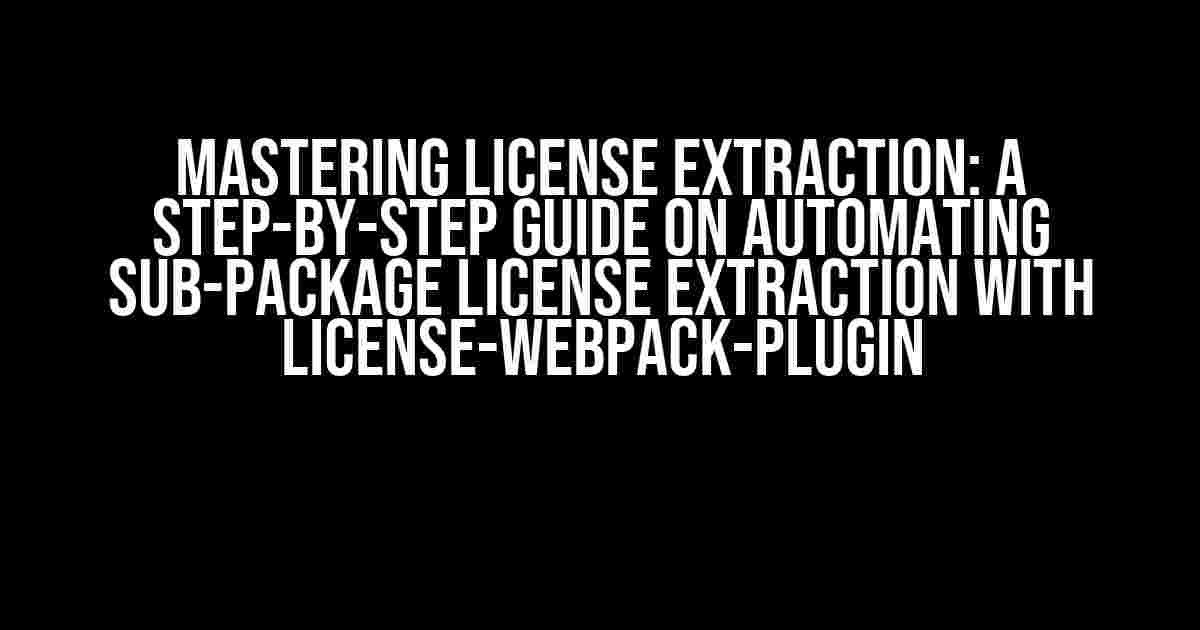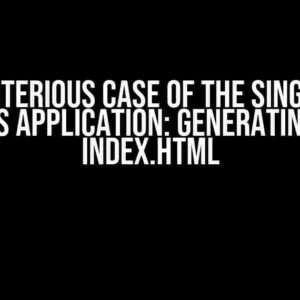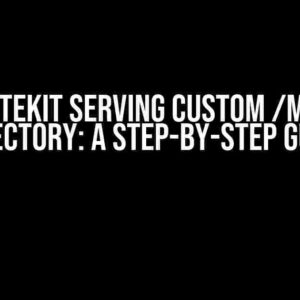Are you tired of manually extracting licenses for sub-packages in your Webpack project? Do you struggle with keeping track of dependencies and their corresponding licenses? Fear not, dear developer! In this comprehensive guide, we’ll show you how to automate license extraction for sub-packages using the powerful license-webpack-plugin. Buckle up and let’s dive in!
- What is license-webpack-plugin, and why do I need it?
- Prerequisites: Setting up your Webpack project
- Step 1: Configure license-webpack-plugin
- Step 2: Define sub-packages and their dependencies
- Step 3: Automate license extraction for sub-packages
- Step 4: Integrate with license-webpack-plugin
- Conclusion
- Troubleshooting Tips
What is license-webpack-plugin, and why do I need it?
The license-webpack-plugin is a Webpack plugin designed to help you manage and extract licenses for your project’s dependencies. It’s essential for ensuring compliance with open-source licenses, avoiding legal issues, and maintaining transparency in your project. By automating license extraction, you can focus on what matters most – building an amazing application!
So, why do you need it? Here are just a few compelling reasons:
- Compliance**: Automating license extraction helps you stay compliant with open-source licenses, reducing the risk of legal issues and reputational damage.
- Transparency**: By extracting licenses, you can provide clear documentation for your dependencies, making it easier for users and contributors to understand your project’s composition.
- Efficiency**: Manual license extraction can be a tedious and time-consuming process. Automating it saves you time and effort, allowing you to focus on developing your application.
Prerequisites: Setting up your Webpack project
Before we dive into the automation process, make sure you have the following setup:
webpack installed in your project (version 4 or higher)
npm install webpack --save-devlicense-webpack-plugin installed in your project
npm install license-webpack-plugin --save-devStep 1: Configure license-webpack-plugin
To start automating license extraction, you need to configure the license-webpack-plugin in your Webpack configuration file. Create a new file called webpack.config.js (if you don’t already have one) and add the following code:
const LicenseWebpackPlugin = require('license-webpack-plugin');
module.exports = {
// ... other configurations ...
plugins: [
new LicenseWebpackPlugin({
perChunk: true, // Extract licenses per chunk (optional)
output: './licenses.json', // Output file for extracted licenses
}),
],
};In this example, we’re telling the plugin to extract licenses per chunk (optional) and output the results to a file called licenses.json.
Step 2: Define sub-packages and their dependencies
Next, you need to define the sub-packages and their dependencies in your project. Let’s say you have two sub-packages: sub-pkg-1 and sub-pkg-2, each with its own dependencies. Create a new file called sub-packages.js and add the following code:
module.exports = {
subPkg1: {
name: 'sub-pkg-1',
dependencies: ['dependency-1', 'dependency-2'],
},
subPkg2: {
name: 'sub-pkg-2',
dependencies: ['dependency-3', 'dependency-4'],
},
};In this example, we’re defining two sub-packages with their respective dependencies.
Step 3: Automate license extraction for sub-packages
To automate license extraction for sub-packages, you’ll need to create a custom function that iterates over the sub-packages and their dependencies. Add the following code to your webpack.config.js file:
const fs = require('fs');
const subPackages = require('./sub-packages');
const extractLicenses = () => {
const licenses = {};
Object.keys(subPackages).forEach((subPkgName) => {
const subPkg = subPackages[subPkgName];
const dependencies = subPkg.dependencies;
dependencies.forEach((dependency) => {
const pkg = require(`${dependency}/package.json`);
const license = pkg.license;
if (!licenses[dependency]) {
licenses[dependency] = license;
}
});
fs.writeFileSync(`./${subPkgName}-licenses.json`, JSON.stringify(licenses, null, 2));
});
};
extractLicenses();In this code, we’re iterating over the sub-packages and their dependencies, extracting the licenses, and writing them to separate JSON files (e.g., sub-pkg-1-licenses.json).
Step 4: Integrate with license-webpack-plugin
Finally, you need to integrate the custom function with the license-webpack-plugin. Update your webpack.config.js file with the following code:
const LicenseWebpackPlugin = require('license-webpack-plugin');
module.exports = {
// ... other configurations ...
plugins: [
new LicenseWebpackPlugin({
perChunk: true, // Extract licenses per chunk (optional)
output: './licenses.json', // Output file for extracted licenses
extractLicenses, // Integrate with our custom function
}),
],
};By integrating the custom function, you’re telling the plugin to use your automation script to extract licenses for sub-packages.
Conclusion
Voilà! You’ve successfully automated license extraction for sub-packages using the license-webpack-plugin. By following these steps, you can ensure compliance, transparency, and efficiency in your Webpack project. Remember to customize the script to fit your specific needs and enjoy the benefits of automated license extraction.
Troubleshooting Tips
If you encounter any issues during the automation process, here are some troubleshooting tips:
- Check your dependencies**: Ensure that you’ve installed the required dependencies, including
license-webpack-pluginandwebpack. - Verify your configuration**: Double-check your Webpack configuration file and ensure that you’ve correctly configured the license-webpack-plugin.
- Debug your custom function**: If you’re experiencing issues with your custom function, add console logs or use a debugger to identify the problem.
| Plugin Option | Description |
|---|---|
perChunk |
Extract licenses per chunk (optional) |
output |
Output file for extracted licenses |
extractLicenses |
Integrate with a custom function for extracting licenses |
That’s it! With this comprehensive guide, you should now be well-equipped to automate license extraction for sub-packages using the license-webpack-plugin. Happy coding!
Frequently Asked Question
Get your answers to the most common questions about automating license extraction for sub-packages when using license-webpack-plugin!
Why do I need to automate license extraction for sub-packages?
Automating license extraction for sub-packages is crucial to ensure compliance with licensing regulations and to avoid potential legal issues. By doing so, you can easily track and manage the licenses of all dependencies, including sub-packages, and avoid manually digging through code repositories.
How do I configure license-webpack-plugin to extract licenses for sub-packages?
To configure license-webpack-plugin, you’ll need to set the ‘subPackages’ option to true in your webpack configuration file. This will allow the plugin to recursively scan through your project’s dependencies and extract licenses for all sub-packages.
Can I customize the license extraction process for sub-packages?
Yes, you can customize the license extraction process for sub-packages by using the ‘subPackagesPattern’ option in your webpack configuration file. This allows you to specify a regex pattern to match specific sub-packages and customize the extraction process accordingly.
How do I handle complex sub-package structures with license-webpack-plugin?
To handle complex sub-package structures, you can use the ‘subPackagesDepth’ option to specify the maximum depth of sub-packages to scan. Additionally, you can use the ‘subPackagesIgnore’ option to ignore specific sub-packages or patterns that you don’t want to extract licenses for.
What kind of output can I expect from automating license extraction for sub-packages?
When you automate license extraction for sub-packages, you can expect a detailed report outlining the licenses for each sub-package, including the license type, version, and any dependencies. This report can be output in various formats, such as JSON, CSV, or HTML, making it easy to integrate into your development workflow.




